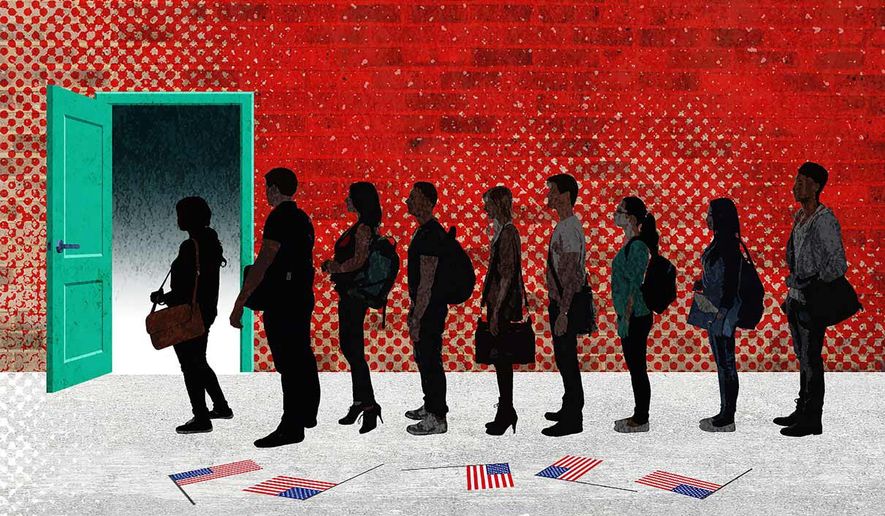OPINION:
This week, Americans across the country will start receiving a $300 monthly check per child, courtesy of the federal government.
The program is part of President Joe Biden’s $1.9 trillion American Rescue Plan, one of the largest social welfare bills ever passed, and comes in the form of a child-care tax break. The monthly check is meant to be temporary, though Democrats in Congress and the White House are pushing for it to become permanent. It will likely be viewed by most Americans as a supplemental monthly income.
This is not the first direct cash payment issued to Americans during this pandemic. Stimulus checks have been doled out throughout. Federal unemployment benefits have been ramped up – so much so THAT many workers are making more money sitting at home than going to work. The childcare checks are the latest example of how the U.S. economy is gradually shifting from a capitalist state into a socialist one.
There is no doubt these supplemental, direct payments to Americans are shifting their view of the federal government’s role in their lives. The U.S. welfare state has always existed to help the poor and elderly, in Social Security checks or monthly allotments for food stamps. But middle-class assistance has previously been different, oftentimes tied to expenses, and not as black-and-white as a check delivered to their mailbox.
As Michael Strain at the American Enterprise Institute writes in Bloomberg, after a few years of these direct payments, it could “become commonly assumed that the government should provide regular cash assistance to households with kids, even to those earning six-figure salaries.” And, of course, they’ll be popular with a large group of Americans, who Mr. Strain believes will come to vote on the issue, tempting politicians to “crank them up, making them more generous, and to argue the government should also be picking up part of the tab for other expenses.”
This for certain is true: Mr. Biden’s White House is already working with Senate Democrats on a $3.5 trillion health care and anti-poverty plan in addition to a $1 trillion infrastructure package.
Yet, however nice it is to receive “free money” from the government – there are also serious economic and cultural ramifications. As Margaret Thatcher aptly pointed out: “The problem with socialism is that you eventually run out of other people’s money.” Don’t believe her? Just look at what’s happening in Cuba.
We already see the ramifications of reckless spending in the U.S.
Inflation has escalated at its fastest pace in 13 years, with the June increase being nearly twice as high as what economic forecasters had predicted.
The NFIB’s small business survey released this week showed 47% of small business owners had to increase their average selling prices, the highest number since January 1981. These business owners are paying more for their supplies, and most notably, labor. Forty-six percent of these small-business owners had job openings that couldn’t be filled last month.
This should come as no surprise. After all, they’re having to compete against the federal government that is paying people more not to work.
Higher inflation also means real wages are falling. In June, they fell 0.5% and are down 1.7% in the last year. This puts pressure on businesses to pay even more, squeezing their margins with the extra money not tied to job productivity, creating even further inflationary pressure.
Meanwhile, the U.S. deficit is growing.
The Congressional Budget Office says it will again hit $3 trillion this year, $745 billion more than its estimate five months ago, as Mr. Biden’s American Rescue Plan goes into effect. It will be the second-largest deficit in history, not counting, of course, Mr. Biden’s $6 trillion in additional spending.
All of this is not sustainable.
It’s one thing for lawmakers to pass targeted spending bills to bolster hospitals and health care supplies or give small business loans to those who had to close shop during the pandemic. For Congressional members to dedicate taxpayer dollars to improving our roads, bridges, and core infrastructure.
But that’s not what’s happening. Mr. Biden’s goal is to be a “transformational president.” This means transforming America from a capitalist state which values hard work and rugged individualism into one where Americans depend on the federal government for their basic needs.
No matter how good that $300 check feels today, there are long-term consequences for it tomorrow. Don’t say you weren’t warned.
• Kelly Sadler is the commentary editor at the Washington Times.




Please read our comment policy before commenting.